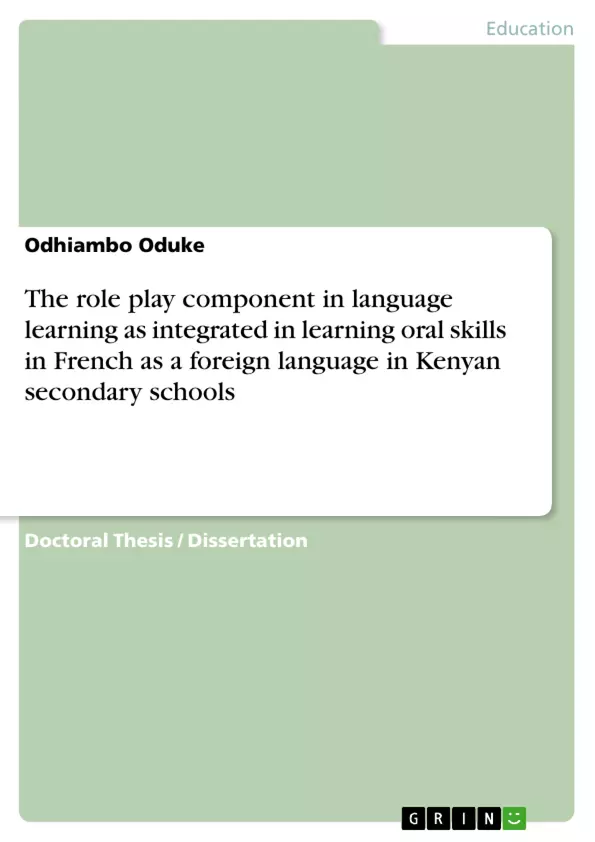This thesis focuses on role play and the development of oral skills in French as a foreign language in Kenya. Ideally as I have observed in this write-up, role play is a low input high output process. The development of speaking skills in French are well enhanced using role-play as a strategy-cum-technique to facilitate the French oral skills to Kenyan learners who have opted to study French as a foreign language.
The conceptual Framework which I have opted to use in this particular academic write-up is Stephen Kraschen’s Monitor Model and the Grounded theory. I have made a deliberate and elaborate focus on Kraschen’s comprehension input theory. For one to speak s(he) has to get some snippets or basic aspects of the language being learnt. My research findings have established that the urge to speak a language being introduced for the first time to the learner, the eagerness and motivation is always there right at the immediate and initial encounter with the language. With the well trained instructor or teacher the oral skills will develop well in tandem with the reading, listening and writing skills.
The grounded theory which I have grafted together with Kraschen’s Monitor Model on language acquisition is well buttressed in social research. Role play is social research on a linguistic perspective.
The numerous authorities I have quoted in this academic presentation attest that role play and language learning is an ongoing study and my research findings and display of data is a contribution towards how oral skills in language learning are acquired by using role play as a technique. The restricted focus in my case is on French as a foreign language within the Kenyan context.
My findings and recommendations corroborate with the other researchers who have done extensive research on language learning and acquisition. The speaking skill is pre-dominantly the most appreciated skill among the four classical language skills. Language educationists, linguists and other social researchers who focus their biased research on language and its varied dynamics in our varied human societies, have observed that the oral skills should be nurtured and developed side by side with the other language skills.
French as a foreign language in Kenya is no exception. [...]
Inhaltsverzeichnis (Table of Contents)
- Abstract
- Acknowledgements
- List of figures
- List of tables
- List of abbreviations and acronyms
- Chapter 1
- 1.0 General Introduction
- 1.1. The main objective of the research
- 1.2 The Research Questions
- 1.3 The study sample
- Chapter 2
- 2.0 Background
- 2.1 Assessment and Evaluation
- 2.2 Kenya Association of Teachers of French (KATF)
- 2.3 Regional French Language Centers
- 2.4 French Language presence in Kenya
- 2.5 Alliance Française
- 2.6 Schools Drama festival
- 2.7 French for specific purposes
- Chapter 3
- 3.0 General analysis
- 3.1 The conceptual Framework
- 3.2 Kraschen's Monitor Model
- 3.4 The Grounded Theory
- Chapter 4
- 4.0 The results of the study
- 4.1 The course books- General overview
- 4.2 The role play content in Pierre et Seydou series
- 4.3 The role play content in the Parlons Français series
- 4.4 The role play content in the Entre Copains series
- 4.5 The National examination assessment
- 4.6 Schools Drama Festival -Plays interpreted in French
- 4.7 The results from the questionnaires
- 4.8 The aspect of language learning which learners enjoy most
- 4.9 How best should French as a foreign language be taught
- 4.10 How does one gain fluency and confidence in expressing oneself in a language
- 4.11 Interview and remarks from the teachers
- Conclusion
- 5.0 Conclusion
- 5.1 recommendations
- Bibliography
- Websites
- Annex 1 - 7
Zielsetzung und Themenschwerpunkte (Objectives and Key Themes)
This thesis examines the role of role play in developing oral skills in French as a foreign language in Kenyan secondary schools. It investigates how role play can be used as a strategy to enhance the development of speaking skills in French for learners who have chosen to study the language. The research is guided by Stephen Kraschen's Monitor Model and Grounded theory, focusing specifically on Kraschen's comprehension input theory.
- The role of role play in developing oral skills in French as a foreign language
- The effectiveness of role play as a strategy to enhance speaking skills
- The application of Kraschen's Monitor Model and Grounded theory to the study of language acquisition
- The importance of comprehension input in language learning
- The relationship between oral skills development and other language skills such as reading, listening, and writing
Zusammenfassung der Kapitel (Chapter Summaries)
Chapter 1 provides a general introduction to the research, outlining the main objective, research questions, and study sample. Chapter 2 delves into the background of French language teaching in Kenya, examining various aspects like assessment and evaluation, the role of the Kenya Association of Teachers of French (KATF), regional French language centers, the Alliance Française, school drama festivals, and the presence of French for specific purposes.
Chapter 3 presents a general analysis of the study's conceptual framework, focusing on Kraschen's Monitor Model and the Grounded Theory. Chapter 4 presents the results of the study, analyzing the role play content in various French course books, the National examination assessment, and data gathered through questionnaires and interviews. This chapter also explores the aspect of language learning that learners enjoy most and how to best teach French as a foreign language.
Schlüsselwörter (Keywords)
The primary keywords of this research include role play, oral skills development, French as a foreign language, Kenya, Stephen Kraschen's Monitor Model, Grounded Theory, comprehension input, language acquisition, and language education.
- Arbeit zitieren
- Odhiambo Oduke (Autor:in), 2013, The role play component in language learning as integrated in learning oral skills in French as a foreign language in Kenyan secondary schools, München, GRIN Verlag, https://www.grin.com/document/232757



